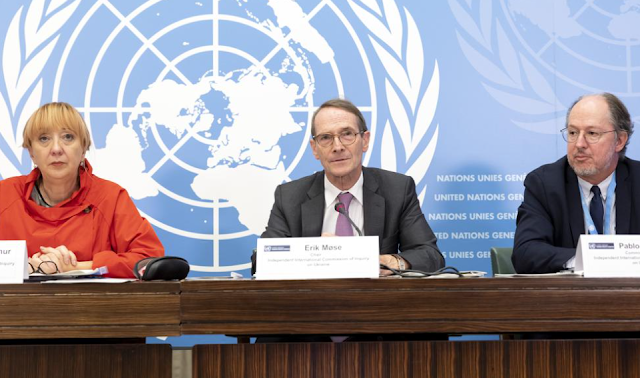UN Rights Experts Present Evidence Of War Crimes In Ukraine
VENEZUELA (AP) — Following Russia's invasion of Ukraine almost seven months ago, a team of specialists hired by the U.N.'s top human rights organization to investigate rights breaches there said Friday that its preliminary inquiry revealed evidence of war crimes committed in the nation.
The Human Rights Council's Commission of Inquiry on Ukraine's designated experts have thus far concentrated on four regions: Kyiv, Chernihiv, Kharkiv, and Sumy.
In their most comprehensive report to date, the team raised severe concerns about executions they were seeking to record in the four areas and highlighted testimonials from former prisoners of beatings, electric shocks, and forced nudity in Russian detention facilities.
Erik Mose, the committee's head, informed the Human Rights Council that the information the commission had acquired led it to the conclusion that war crimes had been committed in Ukraine.
The committee "identified two incidents of ill-treatment of Russian Federation forces by Ukrainian military," commission member Pablo de Greiff told reporters. "We have discovered obviously substantially bigger numbers of occurrences that amount to war crimes on the part of the Russian Federation."
The crew traveled to Ukraine for ten days in June and stopped at Bucha, a city south of Kyiv where Ukrainian officials discovered mass graves and dead scattered around the streets following the withdrawal of Russian forces in late March.
"We were shocked by how frequently people were put to death in the places we visited. According to Mose, the panel is presently looking into these fatalities in 16 towns and localities. He made no mention of who the suspected killers were or which side of the conflict they belonged to.
The findings support media reporting and other accounts of the devastation, fatalities, and despair in Ukraine since Russian President Vladimir Putin gave the order for the invasion on February 24.
Although it is yet unclear if Russia or other suspected offenders will ever face justice, the commission's work may eventually aid the efforts of International Criminal Court prosecutors who may file charges over war crimes in Ukraine.
Following the commission's presentation, Anton Korynevych, the ambassador-at-large for the Ukrainian Foreign Ministry, joined ambassadors from a number of Western nations in denouncing Moscow's aggression. The delegation from Russia skipped the council meeting.
Speaking via video, Korynevych demanded the establishment of a special court with jurisdiction "over the crime of aggression against Ukraine" and the authority to look into prominent Russian political and military figures who may have been accountable.
According to him, responsibility was essential for crimes against humanity and other tragedies connected to Russia's "aggression." Korynevych, however, also emphasized how the war's effects have spread over the globe and "placed multiple nations on the edge of starvation, aggravated severe poverty, created the fear of nuclear disaster unknown before," as well as damaged the livelihoods of millions of people.
According to Mose, commission investigators visited 27 towns and communities, graveyards, and detention and torture facilities. They also spoke with more than 150 victims and witnesses and met with advocacy organizations and government representatives.
He said that an unknown number of Russian soldiers had been found guilty of crimes involving sexual or gender-based assault, with victims ranging in age from 4 to 82.
The panel intends to gradually broaden its inquiry, with particular focus on claims of forced transfers of individuals, filtration camps for those being detained or deported, and accelerated adoption of children.
The discovery of mass graves in Izium, where the bodies exhibit signs of torture, most recently increased the horrifying evidence of Russia's atrocities, said Michele Taylor, the U.S. ambassador to the rights council, referring to a Kharkiv region city that Ukrainian forces recently retook control of.
As "the increasing evidence of Russia's filtering activities, forced deportations, and disappearances" became more apparent, Taylor urged the commissioners to keep looking into it.
She cited "many sources" that claimed that between 900,000 and 1.6 million Ukrainian nationals had been deported and sent to Russia forcefully by Russian officials, as well as claims that children were being sent from Ukraine and placed in Russian orphanages for adoption.
A few of Russia's allies stepped forward to defend Moscow.
The goal of Russia's invasion, according to Ina Vasileuskaya, the deputy permanent representative of Belarus at the U.N. in Geneva, was to defend Russian speakers in Ukraine.
She declared that the Human Rights Council's biased talks that exclusively blamed Russia were fruitless.
Despite Belarus being one of the locations where Russian soldiers assembled before invading Ukraine, Vasileuskaya claimed that her nation was not involved in the fight.
